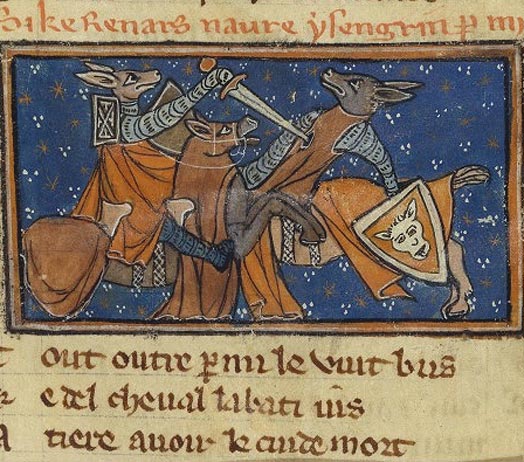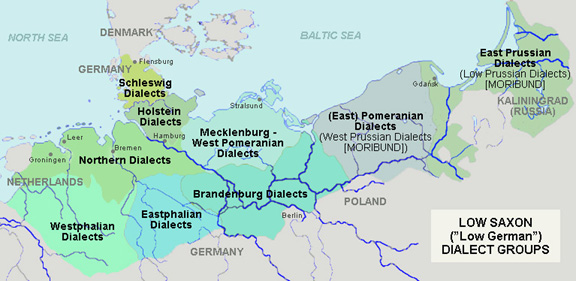|
Heinrich Der Glïchezäre
Heinrich der Glïchezäre (i.e. the hypocrite, in the sense of one who adopts a strange name or pseudonym; also called Heinrich der Gleißner) was a Middle High German poet from Alsace, author of a narrative poem, ''Reinhart Fuchs'' (Reynard), the oldest surviving German beast epic. The date of its composition is about 1180. It is based on a French poem, part of an extensive ''Roman de Renart'', but older than any of the surviving branches of this romance. Of the German poem in its original form entitled ''Isengrînes nôt'' (Isengrin's trouble), only a few fragments are preserved in a mutilated manuscript discovered in 1839 in the Hessian town of Melsungen. A complete version made by an unknown hand in the thirteenth century has been preserved in two manuscripts, one at Heidelberg and one belonging to the archiepiscopal library of Kalocsa. This version is very faithful, the changes made therein pertaining apparently only to form and versification. Its title is ''Reinhart Fuchs' ... [...More Info...] [...Related Items...] OR: [Wikipedia] [Google] [Baidu] |
Middle High German
Middle High German (MHG; or ; , shortened as ''Mhdt.'' or ''Mhd.'') is the term for the form of High German, High German language, German spoken in the High Middle Ages. It is conventionally dated between 1050 and 1350, developing from Old High German (OHG) into Early New High German (ENHG). High German is defined as those varieties of German which were affected by the High German consonant shift, Second Sound Shift; the Middle Low German (MLG) and Middle Dutch languages spoken to the North and North West, which did not participate in this sound change, are not part of MHG. While there is no ''standard'' MHG, the prestige of the Hohenstaufen court gave rise in the late 12th century to a supra-regional literary language () based on Swabian dialect, Swabian, an Alemannic German, Alemannic dialect. This historical interpretation is complicated by the tendency of modern editions of MHG texts to use ''normalised'' spellings based on this variety (usually called "Classical MHG"), which ... [...More Info...] [...Related Items...] OR: [Wikipedia] [Google] [Baidu] |
Jacob Grimm
Jacob Ludwig Karl Grimm (4 January 1785 – 20 September 1863), also known as Ludwig Karl, was a German author, linguist, philologist, jurist, and folklorist. He formulated Grimm's law of linguistics, and was the co-author of the ''Deutsches Wörterbuch'', the author of ''Deutsche Mythologie'', and the editor of ''Grimms' Fairy Tales''. He was the older brother of Wilhelm Grimm; together, they were the literary duo known as the Brothers Grimm. Life and books Jacob Grimm was born 4 January 1785, in Hanau in Landgraviate of Hesse-Kassel, Hesse-Kassel. His father, Philipp Grimm, was a lawyer who died while Jacob was a child, and his mother Dorothea Grimm, Dorothea was left with a very small income. Her sister was the lady of the chamber to the Landgravine of Hesse, and she helped to support and educate the family. Jacob was sent to the public school at Kassel in 1798 with his younger brother Wilhelm Grimm, Wilhelm. In 1802, he went to the University of Marburg, where he stud ... [...More Info...] [...Related Items...] OR: [Wikipedia] [Google] [Baidu] |
German Male Poets
German(s) may refer to: * Germany, the country of the Germans and German things **Germania (Roman era) * Germans, citizens of Germany, people of German ancestry, or native speakers of the German language ** For citizenship in Germany, see also German nationality law **Germanic peoples (Roman era) * German diaspora * German language * German cuisine, traditional foods of Germany People * German (given name) * German (surname) * Germán, a Spanish name Places * German (parish), Isle of Man * German, Albania, or Gërmej * German, Bulgaria * German, Iran * German, North Macedonia * German, New York, U.S. * Agios Germanos, Greece Other uses * German (mythology), a South Slavic mythological being * Germans (band), a Canadian rock band * "German" (song), a 2019 song by No Money Enterprise * ''The German'', a 2008 short film * "The Germans", an episode of ''Fawlty Towers'' * ''The German'', a nickname for Congolese rebel André Kisase Ngandu See also * Germanic (disa ... [...More Info...] [...Related Items...] OR: [Wikipedia] [Google] [Baidu] |
Reynard Cycle
Reynard the Fox is a literary cycle of medieval allegorical Dutch, English, French and German fables. The first extant versions of the cycle date from the second half of the 12th century. The genre was popular throughout the Late Middle Ages, as well as in chapbook form throughout the Early Modern period. The stories are largely concerned with the main character Reynard, an anthropomorphic red fox, trickster figure. His adventures usually involve his deceiving other anthropomorphic animals for his own advantage, or trying to avoid their retaliatory efforts. His main enemy and victim across the cycle is his uncle, the wolf, Isengrim (or Ysengrim). While the character of Reynard appears in later works, the core stories were written during the Middle Ages by multiple authors and are often seen as parodies of medieval literature, such as courtly love stories and chansons de geste, as well as a satire of political and religious institutions.Bianciotto, G. (2005). Introduction. In ... [...More Info...] [...Related Items...] OR: [Wikipedia] [Google] [Baidu] |
Year Of Death Unknown
A year is a unit of time based on how long it takes the Earth to orbit the Sun. In scientific use, the tropical year (approximately 365 solar days, 5 hours, 48 minutes, 45 seconds) and the sidereal year (about 20 minutes longer) are more exact. The modern calendar year, as reckoned according to the Gregorian calendar, approximates the tropical year by using a system of leap years. The term 'year' is also used to indicate other periods of roughly similar duration, such as the lunar year (a roughly 354-day cycle of twelve of the Moon's phasessee lunar calendar), as well as periods loosely associated with the calendar or astronomical year, such as the seasonal year, the fiscal year, the academic year, etc. Due to the Earth's axial tilt, the course of a year sees the passing of the seasons, marked by changes in weather, the hours of daylight, and, consequently, vegetation and soil fertility. In temperate and subpolar regions around the planet, four seasons ar ... [...More Info...] [...Related Items...] OR: [Wikipedia] [Google] [Baidu] |
German Fabulists
German(s) may refer to: * Germany, the country of the Germans and German things **Germania (Roman era) * Germans, citizens of Germany, people of German ancestry, or native speakers of the German language ** For citizenship in Germany, see also German nationality law **Germanic peoples (Roman era) *German diaspora * German language * German cuisine, traditional foods of Germany People * German (given name) * German (surname) * Germán, a Spanish name Places * German (parish), Isle of Man * German, Albania, or Gërmej * German, Bulgaria * German, Iran * German, North Macedonia * German, New York, U.S. * Agios Germanos, Greece Other uses * German (mythology), a South Slavic mythological being * Germans (band), a Canadian rock band * "German" (song), a 2019 song by No Money Enterprise * ''The German'', a 2008 short film * "The Germans", an episode of ''Fawlty Towers'' * ''The German'', a nickname for Congolese rebel André Kisase Ngandu See also * Germanic (disambiguatio ... [...More Info...] [...Related Items...] OR: [Wikipedia] [Google] [Baidu] |
Goethe
Johann Wolfgang (von) Goethe (28 August 1749 – 22 March 1832) was a German polymath who is widely regarded as the most influential writer in the German language. His work has had a wide-ranging influence on Western literature, literary, Political philosophy#European Enlightenment, political, and Western philosophy, philosophical thought in the Western world from the late 18th century to the present.. A poet, playwright, novelist, scientist, statesman, theatre-director, and critic, Johann Wolfgang von Goethe bibliography, his works include plays, poetry and aesthetic criticism, as well as treatises on botany, anatomy, and colour. Goethe took up residence in Weimar in 1775 following the success of his first novel, ''The Sorrows of Young Werther'' (1774), and joined a thriving intellectual and cultural environment under the patronage of Duchess Anna Amalia of Brunswick-Wolfenbüttel, Duchess Anna Amalia that formed the basis of Weimar Classicism. He was ennobled by Karl August, G ... [...More Info...] [...Related Items...] OR: [Wikipedia] [Google] [Baidu] |
Alsace
Alsace (, ; ) is a cultural region and a territorial collectivity in the Grand Est administrative region of northeastern France, on the west bank of the upper Rhine, next to Germany and Switzerland. In January 2021, it had a population of 1,919,745. Alsatian culture is characterized by a blend of German and French influences. Until 1871, Alsace included the area now known as the Territoire de Belfort, which formed its southernmost part. From 1982 to 2016, Alsace was the smallest administrative in metropolitan France, consisting of the Bas-Rhin and Haut-Rhin Departments of France, departments. Territorial reform passed by the French Parliament in 2014 resulted in the merger of the Alsace administrative region with Champagne-Ardenne and Lorraine to form Grand Est. On 1 January 2021, the departments of Bas-Rhin and Haut-Rhin merged into the new European Collectivity of Alsace but remained part of the region Grand Est. Alsatian dialect, Alsatian is an Alemannic German, Alemannic ... [...More Info...] [...Related Items...] OR: [Wikipedia] [Google] [Baidu] |
Low German
Low German is a West Germanic languages, West Germanic language variety, language spoken mainly in Northern Germany and the northeastern Netherlands. The dialect of Plautdietsch is also spoken in the Russian Mennonite diaspora worldwide. "Low" refers to the altitude of the areas where it is typically spoken. Low German is most closely related to Frisian languages, Frisian and English language, English, with which it forms the North Sea Germanic group of the West Germanic languages. Like Dutch language, Dutch, it has historically been spoken north of the Benrath line, Benrath and Uerdingen line, Uerdingen isoglosses, while forms of High German languages, High German (of which Standard German is a standardized example) have historically been spoken south of those lines. Like Frisian, English, Dutch and the North Germanic languages, Low German has not undergone the High German consonant shift, as opposed to Standard German, Standard High German, which is based on High German langu ... [...More Info...] [...Related Items...] OR: [Wikipedia] [Google] [Baidu] |
Kalocsa
Kalocsa (; or ''Kalača''; or Калоча; ) is a town in Bács-Kiskun county, Hungary. It lies south of Budapest. It is situated in a marshy but highly productive district, near the left bank of the Danube River. Historically it had greater political and economic importance than at present. Description Kalocsa is the Episcopal see of one of the four Catholic archbishops of Hungary. Amongst its buildings are a fine cathedral, the archiepiscopal palace, an astronomical observatory, a seminary for priests, and colleges for training teachers. The residents of Kalocsa and its wide-spreading communal lands are chiefly employed in the cultivation of paprika, fruit, flax, hemp and cereals, in the capture of waterfowl and in fishing. Kalocsa is one of the oldest towns in Hungary. The present archbishopric, founded about 1135, is a development of a bishopric said to have been founded in 1000 by King Stephen the Saint. It suffered much during the 16th century from the invasions of O ... [...More Info...] [...Related Items...] OR: [Wikipedia] [Google] [Baidu] |





